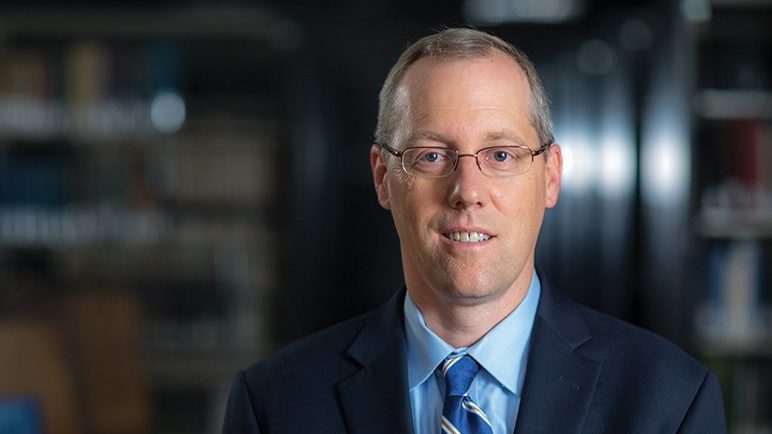Rediscovering the person of Jesus and Scripture can renew the Catholic Church amid secularization and scandal, according to prominent lay evangelizers at a national gathering.
"We need Jesus, we need the church, and we need to undergo transformation ourselves," said Curtis Martin, founder of the Fellowship of Catholic University Students, or FOCUS.
Martin was one of several keynote speakers at the Napa Institute's 13th annual summer conference, which took place July 26-30 in Napa, California.
Attendees were greeted by the institute's executive director John Meyer and co-founders Timothy R. Busch, Napa's board chair, and Jesuit Father Robert Spitzer, the institute's president and this year's conference emcee. The institute's episcopal adviser, Archbishop Paul S. Coakley of Oklahoma City, led the conference's opening prayer.
Former vice president and Republican presidential hopeful Mike Pence also delivered a July 27 keynote address titled "You Shall Be My Witnesses," highlighting the need for the role of faith in public life.
"More than ever, we need people of conviction and faith to be willing to speak out and speak boldly," said Pence.
The gathering's extensive schedule featured an array of presentations and breakout sessions, with numerous Masses, Holy Hours and Eucharistic processions. A July 27 opening Mass was celebrated by Archbishop Timothy P. Broglio of the U.S. Archdiocese for the Military Services, who is president of the U.S. Conference of Catholic Bishops.
Martin and fellow presenters spoke in depth regarding the conference's theme, "What We Need Now: Renewing God’s Presence in Our Lives, in Our Church, and in Our Culture."
The task of spiritual and cultural revival is "not complicated, but it will require transformation, and that is difficult," said Martin in his July 27 talk.
He stressed the need for a "paradigm shift."
With religious belief as a whole on the decline in the U.S., "we’ve moved from Christianity to an apostolic mission," said Martin. "The church still believes and teaches everything she's taught, but we need to teach it from a different perspective."
Catholics "have to 're-understand' the power of Jesus Christ in our lives and in this world," he said. "It's only when you love him first that we can rejoice in the church, because we understand that even though it's messy, it is his means of salvation, not just for us but for everyone."
Martin urged listeners to "become more biblical as Catholics."
"We need to be reading the Scriptures every day, prayerfully," said Martin.
Biblical scholar Tim Gray, president of the Colorado-based Augustine Institute, echoed that call in his July 27 keynote.
In his address, Gray pointed to the Second Letter of Peter as providing "a roadmap for how to live the life of Christ in the world," one that gives practical guidance for attaining heaven amid persecution in a fallen world -- with the greatest threat coming from "false teachers and prophets who arise in the midst of the church."
"We Catholics need to get back to the word of God so that we're not scandalized and dismayed by trials," said Gray.
Several speakers focused on the importance of reaffirming a Christian anthropology in which men and women are understood to be divinely created as such, reflecting God's wisdom and goodness.
"Men, the world has never needed you more and wanted you less," said author Chris Stefanick in his July 27 talk.
Christ is the model for manhood, exemplifying the submission to the divine will and authentic self-mastery that nurtures the life of the church, he said.
"All the powers of hell tremble before a true man of God who's dominated all the powers within himself, and because of that is able to make a gift of himself in love," Stefanick said. "As a church, it's time for us to raise up a new standard of what we want from men."
Alexandra DeSanctis, a fellow at the Washington-based Ethics and Public Policy Center, followed Stefanick with a presentation on Mary called "The True and Mighty Handmaid's Tale."
"She is not only human, she is humanity," said DeSanctis. "Her choice to participate in God's plan reveals to us the gift of Jesus as Emmanuel, God with us."
DeSanctis said "it's in this moment that Mary stands in starkest contrast to the world today, particularly our misconceptions about freedom and about womanhood."
"Far from being oppressed or subjugated as today's feminists would certainly say about her, Mary revealed what a truly empowered and powerful woman looks like … humble, open to God, willing to renounce herself entirely for the sake of doing his will."
In her July 28 address, Helen Alvaré, professor and associate dean at George Mason University's Antonin Scalia Law School, reflected on ways of "Renewing the Church as Mother and Teacher."
With both "light and shadows" marking the life of the church in modern culture, Alvaré said, the faithful should "be not afraid of the difficulties we're facing."
"Do not be shocked that a church of millennia (in age) lists and then comes back to balance," she said.
Alvaré encouraged Catholics to be reassured that the church has "incorporated new things, new ideas and made ourselves comprehensible to cultures all over the world, no matter what gets introduced in the development of human and salvation history."
While evangelization and renewal may seem elusive, "God is way more powerful than we are," she said.

